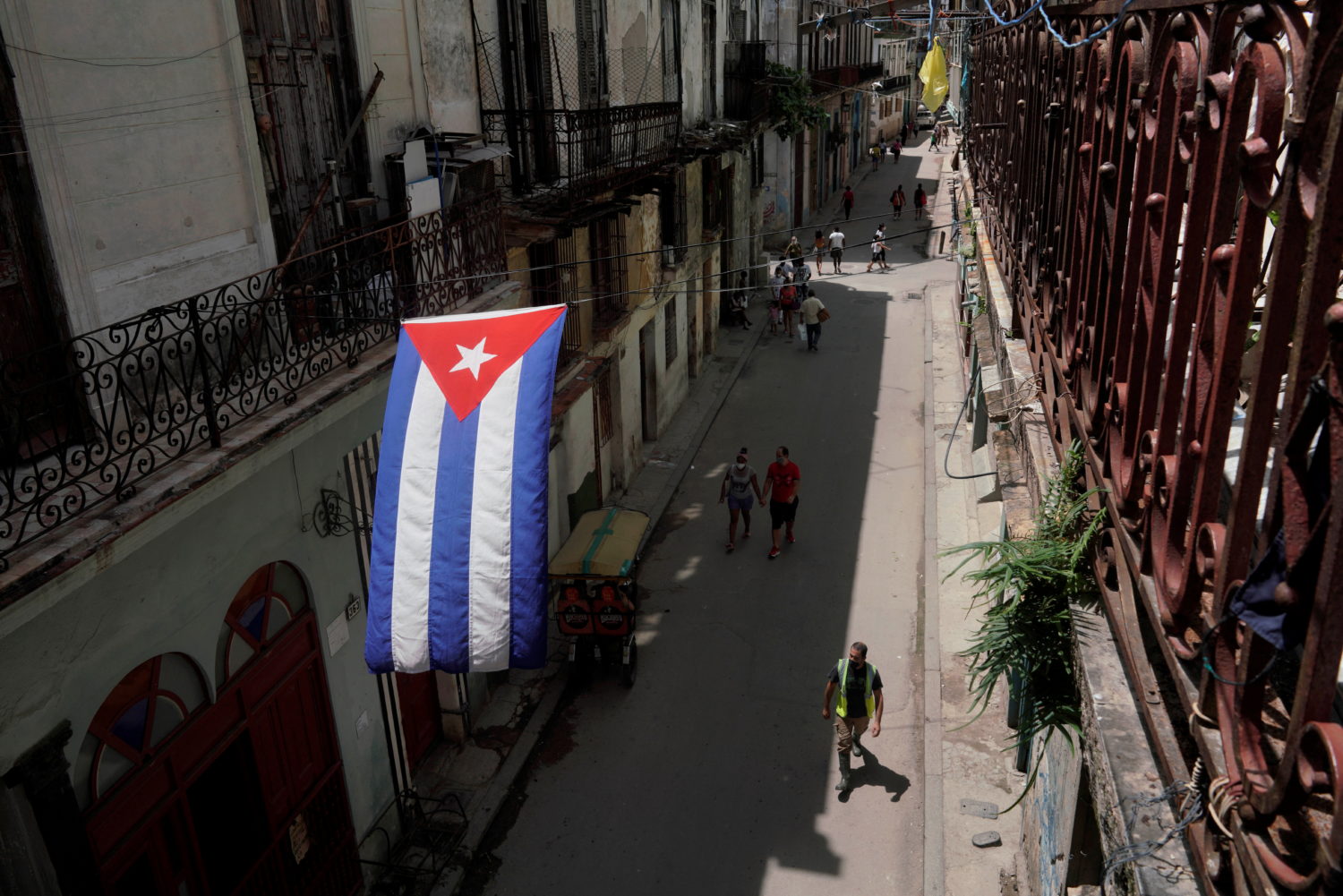
By Matt Spetalnick and Daphne Psaledakis
WASHINGTON (Reuters) -The United States on Thursday imposed sanctions on a Cuban security minister and an interior ministry special forces unit for alleged human rights abuses in a crackdown on anti-government protests earlier this month.
The move marked the first concrete steps by President Joe Biden’s administration to apply pressure on Cuba’s Communist government as it faces calls from U.S. lawmakers and the Cuban-American community to show greater support for the biggest protests to hit the island in decades.
The speed with which the administration has crafted new sanctions further signals Biden is highly unlikely to soften the U.S. approach to Cuba any time soon after his predecessor, Donald Trump, rolled back a historic Obama-era détente with Havana.
“This is just the beginning,” Biden said in a statement, expressing condemnation for “mass detentions and sham trials.”
“The United States will continue to sanction individuals responsible for oppression of the Cuban people,” he said.
Cuban Foreign Minister Bruno Rodriguez, in a message on Twitter, rejected the sanctions as “unfounded and slanderous” and urged the United States to apply such measures to its own record of “daily repression and policy brutality.”
The Treasury Department said the sanctions had been placed on an entire Interior Ministry security unit and on General Alvaro Lopez Miera, minister of the Revolutionary Armed Forces, describing him as leader of an entity “whose members have engaged in serious human rights abuse.”
Thousands of Cubans staged protests a week ago to demonstrate against an economic crisis that has brought shortages of basic goods and power outages. They were also protesting the government’s handling of the coronavirus pandemic and curbs on civil liberties. Hundreds of activists were detained.
Biden had promised during the 2020 campaign to reverse some of Trump’s Cuba policies, but Thursday’s announcement suggests little appetite for a return to rapprochement.
At the same time, the administration is still seeking ways to ease the humanitarian plight of the Cuban people.
The White House said on Tuesday that Biden would form a working group to examine remittances to Cuba in the wake of the protests. The aim is to determine how Cuban-Americans can send money to families on the island while keeping the funds out of the hands of the Cuban government.
Trump had imposed tight restrictions on remittances, which are believed to have previously amounted to several billions of dollars annually.
The White House, in a statement, cautioned that the remittances issue was complex and “requires a measured and thoughtful approach in coordination with experts.”
Biden reiterated on Thursday that his administration is looking for ways to help ordinary Cubans regain internet access after Havana restricted access to social media and messaging platforms including Facebook and WhatsApp.
“We will work closely with our partners throughout the region, including the Organization of American States, to pressure the regime,” Biden said.
The Cuban government has blamed the protests mostly on what it calls U.S.-financed “counter-revolutionaries” exploiting economic hardship caused by U.S. sanctions.
GLOBAL MAGNITSKY SANCTIONS
The sanctions were imposed under the Global Magnitsky Act, used to punish human rights violators with U.S. asset freezes and bans on travel to the United States.
But U.S. officials have acknowledged that Cuban officials rarely have U.S. financial dealings and seldom travel to the United States, limiting the practical impact of such measures.
The unrest appears to have injected a new sense of urgency into Biden’s broad Cuba policy review, which began shortly after he took office in January. Until now, Cuba had not been treated as a top agenda item while the administration dealt with the economic recovery and coronavirus pandemic at home and challenges such as China, Russia and Iran abroad.
Cuba, a State Department official told Reuters, is now a “top priority.”
Analysts say conciliatory moves are unlikely in the near term. Complicating matters was Biden’s poorer-than-expected showing with voters in south Florida’s anti-communist Cuban-American community, which backed Trump’s tough policies toward Havana and Caracas and helped him win the battleground state.
Many analysts say Biden may have to tread carefully on Cuba policy ahead of the 2022 congressional elections.
(Reporting By Matt Spetalnick and Daphne Psaledakis, additional reporting by Jarrett Renshaw and Doina Chiacu in Washington and Sarah Marsh and Marc Frank in Havana; Editing by Dan Grebler, Cynthia Osterman and Sonya Hepinstall)













